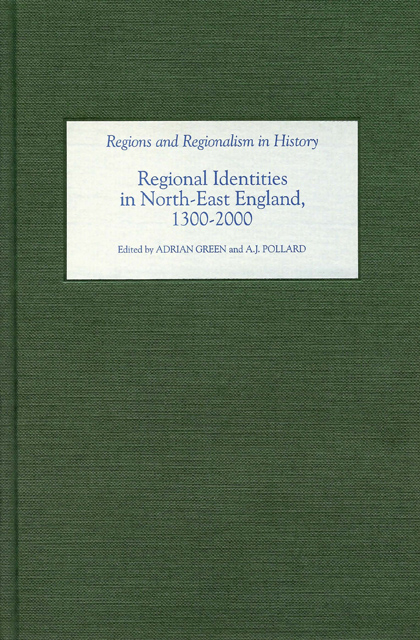Book contents
- Frontmatter
- Contents
- Foreword The AHRC Centre for North-East England History
- Dedication
- Contributors
- Preface
- Abbreviations
- Map
- Introduction Identifying Regions
- 1 North-East England in the Late Middle Ages: Rivers, Boundaries and Identities, 1296-1461
- 2 Borders and Bishopric: Regional Identities in the Pre-Modern North East, 1559-1620
- 3 Law in North-East England: Community, County and Region, 1550-1850
- 4 A Shock for Bishop Pudsey: Social Change and Regional Identity in the Diocese of Durham, 1820-1920
- 5 Business Regionalism: Defining and Owning the Industrial North East, 1850-1914
- 6 Competing Identities: Irish and Welsh Migration and the North East of England, 1851-1980
- 7 Immigrant Politics and North-East Identity, 1907-1973
- 8 Regionalism and Cultural History: The Case of North-Eastern England, 1918-1976
- Conclusion Conclusion Finding North-East England
- Index
2 - Borders and Bishopric: Regional Identities in the Pre-Modern North East, 1559-1620
Published online by Cambridge University Press: 10 March 2023
- Frontmatter
- Contents
- Foreword The AHRC Centre for North-East England History
- Dedication
- Contributors
- Preface
- Abbreviations
- Map
- Introduction Identifying Regions
- 1 North-East England in the Late Middle Ages: Rivers, Boundaries and Identities, 1296-1461
- 2 Borders and Bishopric: Regional Identities in the Pre-Modern North East, 1559-1620
- 3 Law in North-East England: Community, County and Region, 1550-1850
- 4 A Shock for Bishop Pudsey: Social Change and Regional Identity in the Diocese of Durham, 1820-1920
- 5 Business Regionalism: Defining and Owning the Industrial North East, 1850-1914
- 6 Competing Identities: Irish and Welsh Migration and the North East of England, 1851-1980
- 7 Immigrant Politics and North-East Identity, 1907-1973
- 8 Regionalism and Cultural History: The Case of North-Eastern England, 1918-1976
- Conclusion Conclusion Finding North-East England
- Index
Summary
An anonymous appraisal ‘concerning the abused government and afflicted estate of Northumberland’, written to the queen late in 1597, opened dramatically and graphically by referring to the county's ‘gastlie visage, her feared hart, and wasted lyms, so tattered and consumed that no man hathe art no[r] no arte hathe tearmes to unfold her diseases’. Even so, the reporter managed a further four pages, cataloguing shortcomings in every aspect of Northumberland life. The Church and religion were inadequately catered for; there was minimal provision of education at all levels; local justice was discharged irregularly and unsatisfactorily; the conduct of trade was not properly regulated; felons were inappropriately bailed; fines were not levied; sheriffs, wardens and their deputies were defrauding the crown of its dues, while the recent commission appointed to inquire into conditions in the middle march was composed of the worst offenders in that respect; the custodians of castles were not resident in them; Scots held tenements in England; days of truce were not held; and the English warden was openly colluding with his Scottish counterpart, to the detriment of the county. Above all, it declared that ‘our deseases are manifold & grievous bothe in bodye, sowle, and abylitie, seaminge tedious to all men, strange to many, and uncurable to the moste; and therefore it is that they are not undertaken, but desparatelie left as unknowen maladies to amend by tyme and leasure, which will destroye the whole bodye’. It was a woeful portrayal of a wretched and beleaguered part of England, which threatened the well-being of the entire kingdom.
The approaches to Durham were regarded by those from further south as similarly dire, albeit expressed in less sensational terms. An account of Toby Matthew's journey from Oxford to take up his appointment as dean of Durham, in 1583, recorded that the excruciatingly awful night spent at an inn in Northallerton confirmed every rumour heard about the North. The noise, the dirt, the hardness of the beds and what was in the beds left the author feeling that three days in prison would have been preferable to that single night.
- Type
- Chapter
- Information
- Regional Identities in North-East England, 1300-2000 , pp. 49 - 70Publisher: Boydell & BrewerPrint publication year: 2007
- 2
- Cited by



